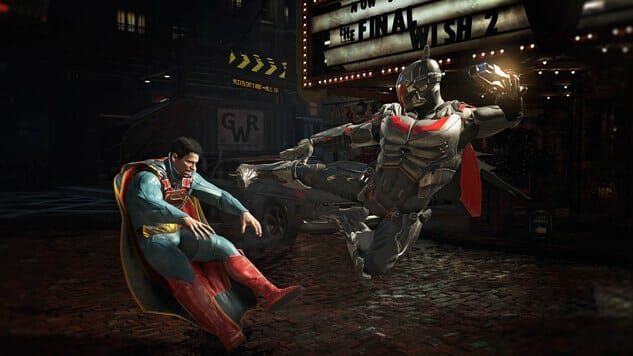Everything Changes in Injustice 2—Except Boring Old Batman

Batman and I don’t have the greatest relationship.
I first realized how tiring I found Bruce Wayne’s absolute ideals when I played Batman Arkham Origins, where he saved his nemesis, the Joker, from a fatal fall, despite the clown having caused chaos and destruction around Gotham City. The Joker’s actions are the cause of all the pain and suffering that followed in Arkham Asylum and Arkham City, and had Batman let the villain die at that moment, countless lives would have been saved and many hardships avoided.
But Batman doesn’t kill, and he believes it’s his duty to save as many lives as he believes possible, including criminals who intend to harm the people he claims to protect. Having seen the events in the other Arkham games that followed saving the Joker, I felt a frustration finally manifest within me regarding Batman’s philosophy on the subject of killing. This goes beyond my feelings on the character, but stretches out to a larger issue within comic books and comic-based media I’m otherwise a fan of. Questioning the morality of killing a villain is deeply ingrained in superhero stories, DC’s especially, with several of its heroes claiming that killing a criminal makes one no better than the one committing the crime.
Because of my frustration with the seemingly black and white take on the subject, I was glad to see Injustice turning its heroes’ morality on its head. The fighting games have been one of DC’s more interesting takes on the subject, as it uses alternate realities to explore how this philosophical conflict could divide its roster of heroes, rather than having them all continue to operate under this status quo. In a universe where Superman kills the Joker after being tricked into killing his wife and child, the Man of Steel has been swayed away from Batman’s mindset, creating a regime under his rule. There is peace, but Superman’s rule is so absolute he has become a dictator and the world has become unrecognizable compared to most of the established DC canon.
This new world opens up new possibilities, and the circumstances challenge characters in ways that a more straightforward DC story doesn’t. Robin sides with Superman in his regime after growing tired of seeing villains escape imprisonment and continue to hurt innocents. Harley Quinn becomes a hero when outside the influence of the Joker. I was hoping that Batman would start to question his own ironclad code as the series progressed, or at the very least that there would be a point where someone could challenge his ideology and win, proving to him all along that these absolutes don’t always hold true.